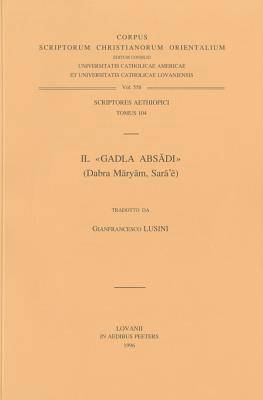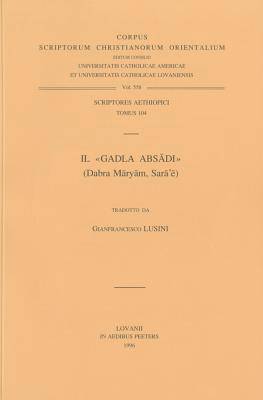
- Retrait gratuit dans votre magasin Club
- 7.000.000 titres dans notre catalogue
- Payer en toute sécurité
- Toujours un magasin près de chez vous
- Retrait gratuit dans votre magasin Club
- 7.000.000 titres dans notre catalogue
- Payer en toute sécurité
- Toujours un magasin près de chez vous
Il 'gadla Absadi' (Dabra Maryam, Sera'e): V. (Corpus Scriptorum Christianorum Orientalium)
V.
G. Lusini
22,30 €
+ 44 points
Description
The Ethiopian monastic movement imspired by the Tigraean monk Ewostatewos of Dabra Sarabi (1273-1352) introduced the need for a religious reform in the northern provinces of Hamasen and Sara'e (modern Erythrea). Over approximately a century's time, Ewostatewos' preaching and rule spreaded to the whole country and finally was accepted by the king and the metropolites (1450), despite the controversy on observing the Sabbath, a practice which is still alive today in the Ethiopian Church. About 1338, Ewostatewos was forced to leave the country and to deliver his community to his senior disciple Absadi, who led it until he died (1381). Absadi was born in the first half of the XIVth century and about 1374 he founded one of the most important monasteries of northern Ethiopia, Dabra Maryam, in the Qwahayn district of the Sara'e region. The Life of Absadi is edited for the first time together with the long colophon of a Gospel belonging to Dabra Maryam, written in 1408/9 by a monk called Yostinos. Being the oldest hagiographical work coming from the Ewostatewosite milieu and one of the most ancient of the whole Ehtiopian literature, the Gadla Absadi gives new interesting data on a still little known phase of the religious history of Ethiopia, between the reign of Amda Seyon (1314-1344) and Dawit (1379/80-1413).
Spécifications
Parties prenantes
- Auteur(s) :
- Editeur:
Contenu
- Nombre de pages :
- 69
- Langue:
- Néerlandais
- Collection :
Caractéristiques
- EAN:
- 9789068318012
- Date de parution :
- 01-01-96
- Format:
- Livre relié
- Format numérique:
- Trade paperback (VS)
- Dimensions :
- 160 mm x 239 mm
- Poids :
- 136 g







